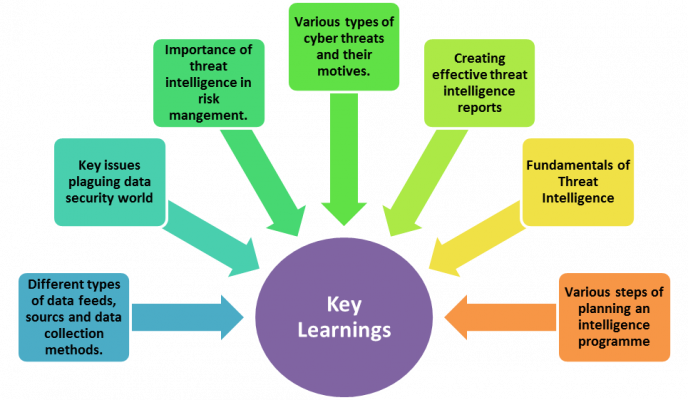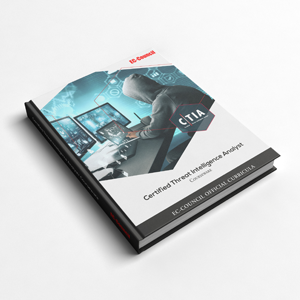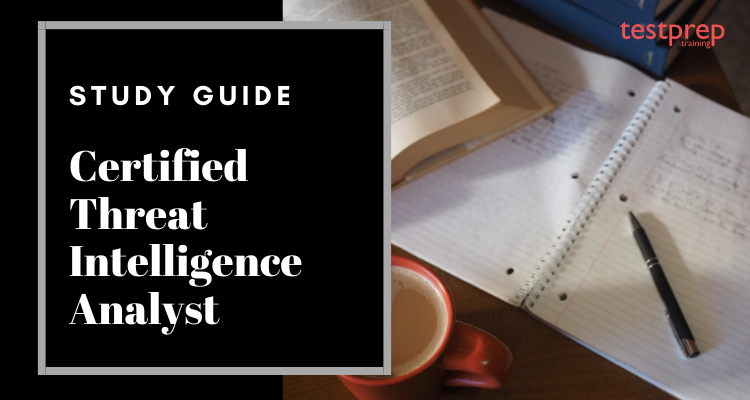Certified Threat Intelligence Analyst (CTIA) is a professional certification offered by the EC-Council. It is designed to validate the knowledge and skills of security professionals in the area of threat intelligence. The CTIA certification is aimed at individuals who are responsible for identifying and responding to cyber threats, including security analysts, security operations center (SOC) personnel, incident response teams, and other security professionals.
The CTIA certification covers a range of areas related to threat intelligence, including:
- Threat intelligence fundamentals
- Cyber threat intelligence lifecycle
- Types of cyber threats and threat actors
- Threat intelligence sources and methods
- Threat intelligence analysis and dissemination
- Threat intelligence tools and technologies
- Threat intelligence metrics and reporting
- Legal and ethical considerations in threat intelligence
Target Audience:
The Certified Threat Intelligence Analyst (CTIA) certification is targeted toward professionals who are interested in threat intelligence analysis, including:
- Cybersecurity professionals: This includes individuals who work in cybersecurity operations, incident response, security monitoring, or vulnerability management, and who are responsible for identifying and mitigating cyber threats.
- Threat intelligence analysts: This includes professionals who specialize in collecting and analyzing threat intelligence, and who are responsible for providing insights and recommendations to support cybersecurity operations.
- Law enforcement professionals: This includes individuals who work in law enforcement agencies, and who are responsible for investigating cybercrime and cyber threats.
- Military and government professionals: This includes individuals who work in military or government organizations, and who are responsible for protecting critical infrastructure, national security, and other sensitive assets.
- IT professionals: This includes individuals who work in IT operations or management, and who are responsible for maintaining the security and integrity of their organization’s IT infrastructure.
Learning Objectives of CTIA exam
Before starting the preparations you must be clear with the exam objectives. Reviewing each objective becomes essential before putting yourself into the exam. The Certified Intelligence Threat Analyst training and credential aim to expertly obtain the following objectives-
- Firstly, to enable organisations with the ability to prepare and run threat intelligence programme that provides effective advice about the existing unknown threats.
- Secondly, to ensure the presence of predictive capabilities as well as proactive measures in the organisation
- Also, to provide individuals with the techniques of data analysis including Statistical Data Analysis, Structured Data analysis and Competing Hypotheses
- Then, to provide a platform to share operational, tactical, strategic and technical intelligence.
- Lastly, providing knowledge for creating effective threat intelligence report.
Key Learning’s Areas

If in case you wish to view and see all the exam details including syllabus and FAQ for the same, then click here!
Key Terms To Get Familiar With
Here are some key terms related to the Certified Threat Intelligence Analyst (CTIA) certification:
- Threat intelligence: The process of collecting and analyzing information about cyber threats, threat actors, and their tactics, techniques, and procedures (TTPs).
- Cyber threat intelligence (CTI): Threat intelligence that specifically focuses on cyber threats and is used to inform cybersecurity operations and decision-making.
- Intelligence cycle: The process of collecting, processing, analyzing, and disseminating threat intelligence.
- Threat actor: An individual or group that conducts cyber attacks or other malicious activities.
- Indicators of compromise (IOCs): Artifacts or behaviors that suggest a system or network has been compromised by a cyber attack.
- Tactics, techniques, and procedures (TTPs): The methods and strategies used by threat actors to carry out cyber attacks.
- Malware analysis: The process of examining malware samples to understand their behavior, capabilities, and potential impact.
- Cyber threat hunting: The proactive process of searching for and identifying potential cyber threats before they can cause harm.
- Threat intelligence platform (TIP): A tool or platform that helps organizations collect, analyze, and share threat intelligence data.
- Cyber threat intelligence analyst: A security professional who is responsible for collecting, analyzing, and disseminating threat intelligence to inform cybersecurity operations and decision-making.
Study Guide for EC-Council Certified Threat Intelligence Analyst (CTIA) Exam
The CTIA exam is necessary for those who deal with threats on a daily basis. Hence the preparation for the exam should be at par, to excel. Here we provide our step-by-step preparatory guide to crack the exam.

Step 1: Clarity of Concepts
The first step is to have clarity of the exam course. You should be clear with the modules and concepts. Refer the official guide available at the website of EC-Council for a detailed understanding of the exam.
Step 2: Schedule your Time
Fix a routine for your preparation. Daily activities and work can be a distraction, therefore devising a study plan and following it is what we recommend.
CTIA exam has 50 questions covering various topics. Creating a list of all the topics and striking them off as you prepare is very efficient. This helps you track your preparations. Also start by strengthening your weaker areas and polishing them. Remember that time is of great essence, so prepare early and set your foot in the Threat Intelligence Industry.
Step 3: Refer Books and other Learning Resources

Books have always been the ultimate best friend while preparing for an exam. Make sure you refer the authentic books from genuine sources for content clarity and in-depth understanding. Look for the online test guide for the EC-Council Certified Threat Intelligence Analyst book pdf.
We recommend you the official book by EC-COUNCIL: CTIA v1 e-Courseware
Also, you should look online for the learning resources. There are abundant resources available online. Choose the ones that best suit you from the plethora of options. Additionally you can also refer to EC-Council Blogs for further insights about the concepts
Step 4: Training Course
Training is an important part of your preparations. EC-Council Certified Threat Intelligence Analyst (CTIA) training courses provides you profound knowledge about the exam. EC-Council offers its own training course for the Certified Threat Intelligence Analyst Exam. This three day training provides you with all the skills that are essential for our exam. Additionally, it will help you gain hands on practice and real time interaction with subject matter experts. The training programme can be taken up in the following ways-
- iLearn (Self-Study)
- The iLearn programme is based on the concept of self-study. To help with test preparation, EC-Council offers a streaming video version of its training course.
- iWeek (Live Online)
- The iWeek Programme is a live, online, instructor-led training course which you can attend from anywhere. All you need is a stable internet connection.
- Master Class
- Under the Master Class programme you are offered an opportunity to learn form world -class instructors and top Info security professionals.
- Training Partner (In Person)
- The Training Partner programme offers training in the real world. You can collaborate with your peers and gain real-world skills.
Step 5: Join a study group
Online forums and study groups are essential ingredients of your preparations. They promote healthy discussions and help you stay updated with the updates from around the worlds. Also you get an opportunity to connect with your peers who are on the same road to this exam. Moreover, such groups help you clarify your doubts and in CTIA certification review for getting better understanding while preparing. It’s advisable that you join the EC-Council Community
Step 6: Attempt Practice Tests
The final step is to check your preparations. This can be done by attempting practice tests. Moreover, these tests will help you analyse your hard work and also identify your weaker areas. Working on them helps you prepare well. Moreover, attempting multiple practice tests will equip you with time management skills which will come handy during the real exam. Therefore, Attempt multiple EC-Council Certified Threat Intelligence Analyst (CTIA) practice tests and boost your confidence.
Importance of Certified Threat Intelligence Analyst (CTIA) Study Guide
A Certified Threat Intelligence Analyst (CTIA) study guide can be a valuable resource for individuals who are preparing for the CTIA certification exam. Here are some reasons why you might consider using a CTIA study guide:
- Comprehensive coverage of exam topics: A good CTIA study guide should cover all the key topics and concepts that will be tested on the certification exam. This can help you identify areas where you need to focus your study efforts and ensure that you have a thorough understanding of all the relevant material.
- Structured study plan: A CTIA study guide can help you create a structured study plan that allows you to cover all the material in a systematic way. This can help you stay organized and ensure that you have enough time to review all the material before the exam.
- Practice exercises and sample questions: Many CTIA study guides include practice exercises and sample questions that allow you to test your knowledge and identify areas where you need to improve. This can be a valuable tool for gauging your readiness for the exam and focusing your study efforts.
- Tips and strategies for the exam: A CTIA study guide can provide tips and strategies for approaching the exam, such as time management techniques and test-taking strategies. This can help you feel more confident and prepared on exam day.
- Recommended resources: Many CTIA study guides also provide links to additional resources, such as recommended reading materials, online courses, and study groups. These resources can be valuable supplements to your study efforts and help you deepen your understanding of the material.
Overall, a CTIA study guide can be a valuable tool for individuals who are preparing for the CTIA certification exam. It can help you stay organized, identify areas where you need to improve, and feel confident and prepared on exam day.



